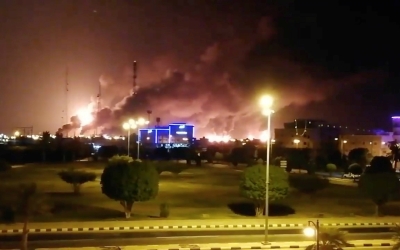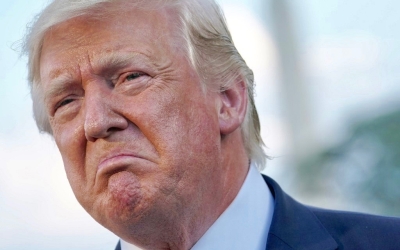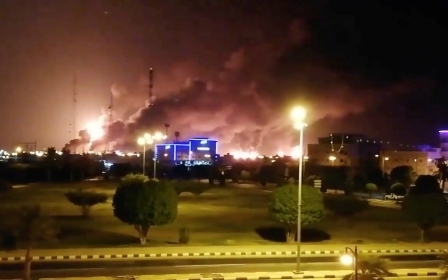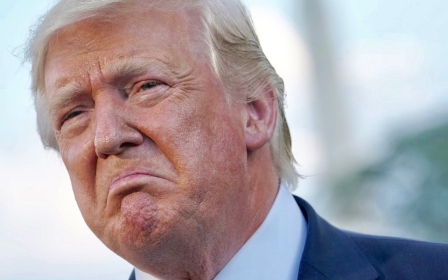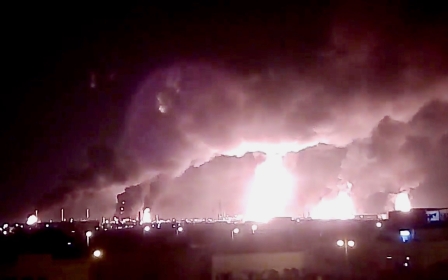Oil prices post biggest gain since 1991 Gulf War after attacks on Saudi plants
Oil prices soared on Monday, with Brent crude posting its biggest intra-day percentage gain since the Gulf War in 1991, after an attack on Saudi Arabian oil facilities on Saturday shut down about five percent of global supply.
Brent crude futures, the international benchmark, rose by as much as 19.5 percent to $71.95 per barrel, the biggest intra-day jump since 14 January, 1991.
Saudi Arabia is the world’s biggest oil exporter and the attack on state-owned producer Saudi Aramco’s crude processing facilities at Abqaiq and Khurais has cut output by 5.7 million barrels per day (bpd).
The company has not given a timeline for the resumption of full output.
Aramco's full return to normal oil production volumes "may take months," two sources briefed on the company's operations told the Reuters news agency on Monday.
"It is still bad," one source said.
On Sunday, an industry source briefed on the developments told Reuters that Saudi Arabia's oil exports will continue as normal this week as the kingdom taps into stocks from its large storage facilities, but that Aramco may have to cut exports later if the outage in output continued for long.
Bahrain pipeline closed
Saudi Arabia shut down its crude oil pipeline to Bahrain following the attacks, two trade sources told Reuters on Monday.
The pipeline, which carries 220,000 to 230,000 bpd of Arab Light crude from Aramco to Bahrain's Bapco, was closed after the attacks reduced output of mainly light crude grades, one of the sources said.
Bapco is working to secure vessels to bring in around two million barrels of Saudi crude as a result of the pipeline shutdown, the sources said.
“We think the attacks would be a wake up call for investors, who have failed to price in risk within the price of crude," said Hue Frame, managing director at Frame Funds in Sydney.
“Although global supply will contract in the near term, the United States has the ability to supply this contraction.
“With developments over the weekend, market participants will add additional factors when working out the fair value of crude on top of the usual supply and demand factors.”
Trump says US 'locked and loaded'
US President Donald Trump said he had approved the release of oil from the US Strategic Petroleum Reserve (SPR) if needed in a quantity to be determined due to the attack.
Trump also said the United States was “locked and loaded” for a potential response to the attack on Saudi Arabia’s oil facilities.
Yemen's Houthi rebels claimed responsibility for the pre-dawn strike on Saturday, saying they had conducted the attack with 10 drones.
However Middle East Eye, citing an Iraqi intelligence official, reported on Sunday that the attacks were carried out by Iranian drones launched from Hashd al-Shaabi bases in southern Iraq.
A US official told Reuters that there were 19 points of impact on the targets and the attacks had come from the west and north-west - the direction of Iraq and Iran - not Yemen.
The official added that Saudi officials indicated they had seen signs that cruise missiles were used in the attack.
Officials quoted by the New York Times spoke of a mixture of drones and cruise missiles that might have been deployed, though not all hit their targets.
Iraqi Prime Minister Adel Abdul Mahdi received a phone call on Monday from US Secretary of State Mike Pompeo, his office said in a brief statement.
Abdul Mahdi's office did not specify what was discussed.
Iraq denied on Sunday that its territory had been used to carry out the attacks on Saudi Arabia.
“This attack has material implications for the oil market, as a loss of 5 million barrels per day of supplies from Saudi Arabia cannot be met for long by existing inventories and the limited spare capacity of the other OPEC+ group members,” said Alan Gelder, vice president for refining, chemicals and oil markets at Wood Mackenzie.
Aramco is battling to reassure markets with the attacks roiling investor confidence ahead of the state-owned giant's mega stock listing.
The strikes present a major test for the kingdom's newly appointed energy minister Prince Abdulaziz bin Salman – a half-brother to the crown prince – with the attacks raising doubts over Aramco's upcoming two-stage stock market debut
Middle East Eye delivers independent and unrivalled coverage and analysis of the Middle East, North Africa and beyond. To learn more about republishing this content and the associated fees, please fill out this form. More about MEE can be found here.


